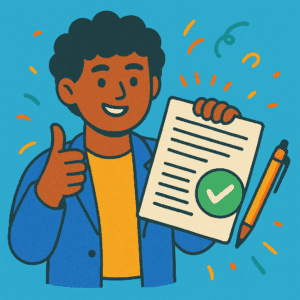A much-maligned, feared, and misunderstood part of job searching is the humble cover letter. The importance of this document may come down to a generational divide… with the older folks considering it a necessity and those of fewer years often skipping it completely. Here’s our take: when you’re given the chance, use it to your advantage.
After all, job searching is really just a big game of out-strategizing others. Just friendly competition, of course.


What’s The Point
A resume tells mostly about your achievements and your history. Your cover letter? That’s your chance to talk about the future. It’s not just a rehash of your work history, it’s your opportunity to explain why this job, why this company, and why now.
The more you’re making a pivot (like a career change, new industry, or moving to a new role level), or the less experience you have in general, the more important the cover letter is to tell your story.
🤙 Heads up: With mass applications and AI-generated everything, a letter that sounds human can give you an edge. If the application doesn’t let you add a letter, be sure to customize your resume highlight/summary and answer any “Why do you want to work here?” application questions just like a mini-cover letter.
Start Strong
Skip the “To Whom it May Concern” or “Dear Hiring Manager”. Address it directly if you can (sometimes Linkedin reveals the “job poster”), or put your own twist on it to match the vibe (“Hi TestCorp Team” or “Hello sandwich artisans!”)
Unless you’re applying for something ultra-traditional, don’t bother with formal letter formatting. Just use the same header from your resume to include your contact info.
Then nail your intro. Think of it as your elevator pitch: a few sharp, human sentences that show who you are and why you’re a match.
❌ Skip:
I’m a Functional Human and I’m excited to apply here!
✅ Try:
With 4 years in the industry and a passion for simplifying the chaotic, I’m ready to jump in and make an impact.
Tell A (Short) Story
Pick one of the highlights from your resume and frame it as a micro-story. What did you do specifically? What were the results? This keeps your letter personal, memorable, and relevant.
Then spend a couple of sentences explaining why you applied. Be specific. Maybe it’s something about their product, a value they live out, or a problem they’re solving that you genuinely care about.
🤙 Pro tip: Incorporate language from their company pages or job posting where you can. It helps make your fit even more obvious to someone scanning quickly (especially if they’re not an expert in your domain). Think “customer care” vs. “user advocate”.
Always Be Closing
Remember writing papers in school? Just like those, you should wrap it all up with a summary of what you wrote above. Mention anything specific the job calls for that you haven’t yet (like software skills or certifications). If there’s something you particularly admire about the company, mention it! A thoughtful compliment can go a long way.
Put it All Together
A good cover letter doesn’t need to be long or perfect (actually, it shouldn’t be those things.) It just needs to be you, but a little more polished. Keep it concise and aim for connection. And upload as a PDF when a file is needed!
At worst? They don’t read it.
At best? It’s your ticket to an interview.
Try our downloadable template (based on this advice of course!) in our Toolkit Library.

I agree. A letter can personalize a resume and provide the person reading it with some tidbit that gets their attention. A good letter will make them want to see the “rest of the story” in the resume.